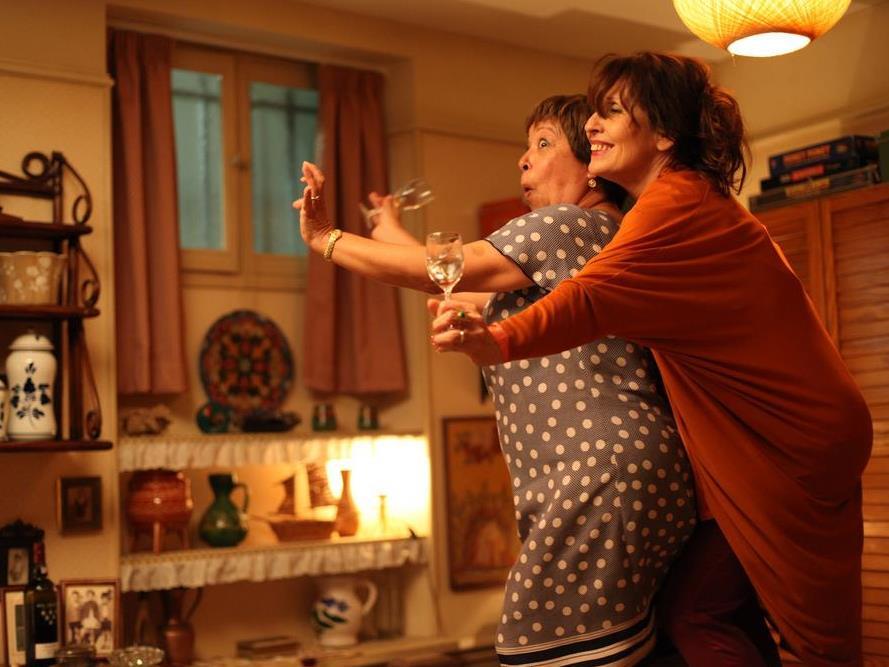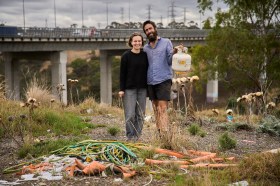As long-term Portuguese immigrants in Paris working service roles to support their family, the film’s married protagonists come complete with clear designations, their daily routine only heightening the nationality and occupation-based conflict. Maria Ribeiro (Rita Blanco, Amour) toils as a conscientious concierge in her luxurious apartment building, always putting the needs of the wealthy tenants above her own. Her husband José (Joaquim de Almeida, Fast & Furious 5) aims to please as the popular foreman for an ailing construction company, the firm’s prosperity reliant upon his hard work.
A wealth of juxtaposition-heavy amusement stems from Maria and José’s altercations with those better off through their efforts; however The Gilded Cage’s crowd-pleasing reputation rests upon more than the usual. The recent audience choice winner at the 2013 European Film Awards doesn’t just display and differentiate its cultural and societal distinctions, as evident as they are, but skewers their basis. A sudden inheritance is the catalyst, with the central couple making plans to return to and retire in their home country. Their respective employers (The Two-Sided Mirror’s Nicole Croisille and Beur sur la ville’s Roland Giraud) try to stop their departure through acts of kindness; their family members – children Paula (Barbara Cabrita, Just Ines) and Pedro (debutant Alex Alves Pereira), and Rosa’s selfish sister Lourdes (Jacqueline Corado, Biloba) – provide their own complicating factors.
Starting with stereotypes, then subverting such categorisation through playfully parodying their rationale, first-time feature writer/director Ruben Alves and his co-scribes Hugo Gélin (Just Like Brothers) and Jean-André Yerles (French TV’s Desperate Parents) take both the fun and thoughtful approach. In combining the comic with the contemplative, it might be the former mode that monopolises attention, but the latter remains unmistakable as Maria and José become aware of their importance to those around them, and – with more than a touch of satire – rally against all that makes them indispensible.
Savvy cross-cutting by editor Nassim Gordji Tehrani (A Happy Event) sees the sentimental and the observant intertwined in a film that endeavours to breezily balance both, just as handsome imagery lensed by cinematographer André Szankowski (Lines of Wellington) casts an appropriately warm sheen; however it is The Gilded Cage’s story and stars that shine. The simplicity of Alves’ semi-autobiographical offering is apparent; so too its effectiveness, its economical but still engaging execution an accomplishment given the helmer’s relative filmmaking inexperience (with 2002 short À l’abri des regards indiscrets his sole other behind-the-camera credit).
Of course, with such a sprawling mass of on-screen participants – including the delightful Chantal Lauby (Grand départ) as a potential addition to the family – the performers rightfully take centre stage, each taking part in a juggling act between the broad and the delicate. Supports may favour the first, but their interactions with the nuanced leads brings intricacy and intimacy in a film that could have settled for stating the obvious. Blanco and de Almeida’s surprisingly tender efforts imbue Maria and José’s plight with poignancy and perception within and beyond its comfortable genre confines, perhaps The Gilded Cage’s greatest achievement.
Rating: 3.5 out of 5
The Gilded Cage (La cage dorée)
Director: Ruben Alves
France, 2013, 91 mins
30 December – 12 January
Release date: December 12
Distributor: Palace
Rated: M





